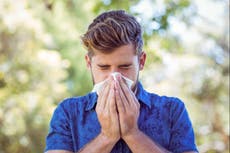Allergy expert shares tips on how to tackle hay fever symptoms as pollen count soars
Margaret Kelman from Allergy UK speaks to reporter Zoe Tidman to answers questions on treatment options, precautions and more


Picnics in the park, long walks in the countryside, meeting up with friends for a catch-up outside…
All sound lovely ways to spend time outside on a warm summer’s day. But for hay fever sufferers, they could also lead to watery eyes, a runny nose and sneezing.
With grass pollen already in peak season and people spending more time outside in summer, many may have already seen these familiar symptoms return.
And forecasters issued some bad news to hay fever sufferers this week, saying a very high pollen count as expected in many parts of the country.

Margaret Kelman from Allergy UK has answered questions submitted by our readers on everything related to hay fever, as people brace themselves to battle the symptoms over summer.
The group’s specialist allergy nurse spoke about treatment options available, offered tips on what precautions to take and even how pregnancy can affect hay fever in our Q&A session.
It is estimated 10 to 30 per cent of UK adults are affected by this allergic reaction to pollen, which can also cause headaches, coughing and itchy eyes.
Join our commenting forum
Join thought-provoking conversations, follow other Independent readers and see their replies
Comments


Bookmark popover
Removed from bookmarks